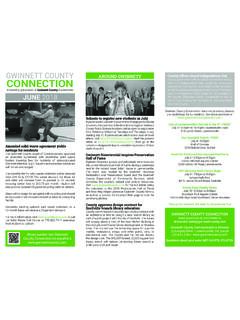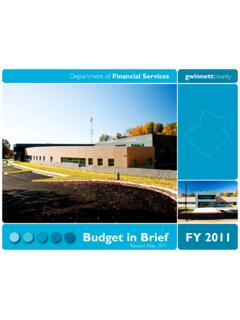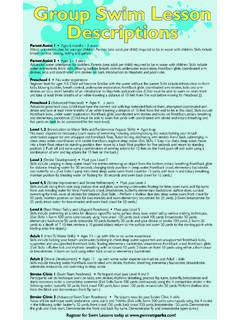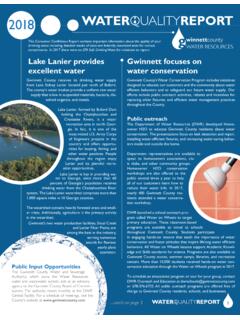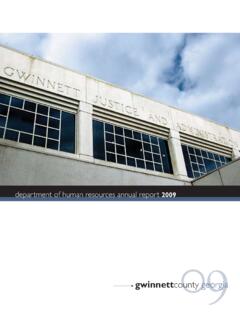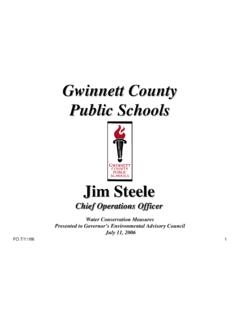Transcription of Stormwater Credits Manual - Welcome to Gwinnett
1 Stormwater Credits Manual Department of Water Resources Gwinnett county , GA Revised 2011-02-10 Updated urls 2011-08-12 PRINTED 2011 Stormwater Credits Manual Department of Water Resources Gwinnett county , Georgia Acknowledgements This Credits Manual was developed with participation from members of the Stormwater Credits Stakeholder Committee, along with Gwinnett county Department of Water Resources Staff, which includes the following: Committee Member Representing Mark Anderson Homebuilders Chad Baker Commercial Developer Sheldon Glorit Gwinnett county public Schools Carol Hassell Environmental Larry Hedges Citizen / Georgia Environmental Protection Division Bradley Hix Multi-Family Developers Robert Hume Citizen / Commercial Property Owner David Leonard Engineer Chad Oelstrom Engineer Michael Paris
2 Council for Quality Growth Jerry Presley Council for Quality Growth Jahnee Prince Council for Quality Growth Jay Puckhaber Commercial Developer Sandra Reeves Commercial Developer Walter Rekuc Commercial Contractor Mark Richardson Homebuilders Jim Steele Gwinnett county public Schools Edward Sullivan Homeowner Greg Taylor Churches Jeff Timler City Gwinnett county Department of Water Resources Staff David Chastant (past employee) Susan Cowart Bryan Lackey (currently with Gwinnett county Planning & Development) Jim Scarbrough Frank Stephens Fuller, Mossbarger, Scott and May Engineers, Inc.
3 Gwinnett county Stormwater Credits Manual Revised 2011 Section Page Overview 1 Goals 2 Residential property owner Non-residential property owner FAQs Use of Manual 3 Credits Descriptions 4 New Developments Retrofitting Existing Stormwater Control Facilities Existing Stormwater Control Facilities (installed between 2000-2006) 5 Watershed Stewardship Credit public Participation 6 Conservation Use Valuation Assessment (CUVA) 7 Low Impact Parcel Farmland Deep Tillage 8 Stream Restoration/Streambank Stabilization 9 Watershed Improvement Project Participation Conservation Easement 10 10-11 county Approved Training Program 12 Rain Barrels Stream Buffers that exceed 75 standards 13 13-14 Fencing Livestock Out of Stream Automatic Sprinkler Sensor Installation direct Discharge 15 Septic Tank Maintenance Connection to Sanitary Sewers 16 Summary Table of Watershed Stewardship Activities 17 Non-Residential school Education 18 Watershed Education Curriculum 19 Watershed Stewardship Activities Gwinnett Environmental & Heritage Center 20 Water Quality Credit 23-24 Cisterns 25-26 Residential Raingardens/Bioretention Facilities 27 Channel Protection Credit 28 Peak Flow Credit 29-30 Partial Credit
4 Award Applications Timing of Application Review 31 Appeals Credit Requirements Credit Application Summary 32 Flowchart 33-34 Renewal Requirements 35 Change of Property Ownership Credit Calculation Examples 36-39 Stormwater Credit Application Form Appendix A Non-Residential school Education Application Form Appendix D Bibliography and Web Site References Appendix E Glossary and Definitions Appendix F Table of Contents *Historical Appendix B & C were combined into Appendix A during credit Manual revisions in 2008. * Overview As development occurs, the amount of Stormwater runoff increases since there is less vegetated area to soak up rainfall. This leads to an increased risk of flooding and erosion due to the higher volume and velocity of Stormwater runoff.
5 The additional sediment from construction activities and pollutants (such as oil from driveways & roadways and fertilizers from lawns) can impair water quality, destroying fish habitats and disrupting the natural ecology of streams and rivers. Gwinnett county has implemented a Stormwater utility in order to provide support for major Stormwater activities such as: replacing Stormwater pipes, reducing flooding, fulfilling regulatory requirements, and reducing pollution carried by Stormwater runoff to local waterways. Proceeds from the Stormwater fee fund the Stormwater utility. These fees are based on the amount of impervious area (hard surfaces, buildings, parking lots, concrete patios and swimming pool decks, etc.) on each property. The impervious area is calculated from aerial photography obtained in February of the year prior to the billing.
6 Gwinnett county has additional information concerning the utility and its mission on the website at Please refer to the link to the Stormwater Utility. The Gwinnett county Department of Water Resources (DWR) has implemented a Stormwater Credits Program to provide incentives to homeowners, business owners, developers, designers, builders, municipal officials and other property owners within the community. Purpose of Credits Provide incentives to property owners to reduce their service fee Reduce costs to Gwinnett county In exchange for performing certain activities that improve water quality and afford other Stormwater cost savings for the Gwinnett county DWR, local property owners in unincorporated Gwinnett county and the City of Lilburn can reduce their Stormwater fees. The ultimate success of the program will be to encourage better site design and citizen action that: Diminishes environmental impact; Reduces or eliminates localized and downstream flooding; Provides better Stormwater management education; Reduces the need for engineered Stormwater quality or quantity improvements; Encourages making improvements to water quality; and/or Affords other Stormwater cost savings for the Gwinnett county DWR.
7 By taking advantage of the credit system, homeowners, developers, builders, and other property owners can reduce the Stormwater management quantity and/or quality requirements for the Gwinnett county DWR. The credit system can reduce the long term operation and maintenance costs to Gwinnett county and its residents and directly translate into cost savings for Gwinnett county Stormwater Credits Manual 1 revised February 11, 2011 the property owner who opts to participate. The credit is determined through an application procedure that is available to all property owners. Stormwater Credits must be tied directly to or have a direct impact on those elements managed and supported by the Gwinnett county DWR Stormwater Utility. These include: Private and public Stormwater conveyance systems such as streams, channels, pipe systems and similar facilities. Private and public Stormwater Best Management Practices (BMPs).
8 BMPs are effective, practical, structural or non-structural methods which prevent or reduce the movement of sediment (particulate matter transported by water), nutrients which promote abnormally high organic growth, pesticides, and other pollutants from the land to surface or ground water. Examples include Stormwater quality detention basins which temporarily hold runoff and release it at a slower rate, retention basins which hold water rather than release it, stream buffers which filter runoff, and similar facilities. Credit practices help protect the environment by reducing the amount of water and pollution reaching our streams. Impact to streams. This includes measures that will improve water quality and increase awareness through education. Stormwater permitting requirements such as those within the community s National Pollutant Discharge Elimination System (NPDES) permit including public education and outreach.
9 Other similar programs or practices. Design and construction of many of these practices will require approval (this process is termed permitting) by the Gwinnett county DWR. Property owners must comply with standards and regulations that have been established for new development, redevelopment, zoning, etc., and are encouraged to contact DWR staff for additional guidance. Credit Program Goals The Credit Program was developed with the goals that it: Will not harm the financial integrity of the Stormwater Utility; Will provide an incentive to Gwinnett county property owners to reduce their Stormwater utility bill; Property owners can earn Credits by performing activities that slow Stormwater runoff down and keep it on site. Will raise awareness of Stormwater quantity and quality issues; Will produce environmental benefits; Will have a regulatory and technical basis; Will be easy to administer and maintain; Will provide a benefit to the Stormwater Utility greater than the cost to administer; Will receive public support and involvement; and Will have a proven track record based on community experience in other parts of the country.
10 Stormwater Credits are offered as an incentive to property owners for being good stewards of the Gwinnett county Stormwater resources. The benefit to the property owner is a reduction in the Stormwater utility bill Gwinnett county Stormwater Credits Manual 2 revised February 11, 2011 The result is that the entire community benefits from these enhancements or improvements to the Stormwater system through the reduction in flooding, and a cleaner water system. Residential Property Owners All property owners can earn Credits . The credit program has been developed for all customers, including residential property owners. Residential property owners in unincorporated Gwinnett county and the City of Lilburn are eligible to apply for Credits up to 40% if they take actions that diminish the impact of Stormwater from their property. Non-residential Property Owners Non-residential property owners typically have very large impervious areas (hard surfaces, buildings, parking lots, etc.)
